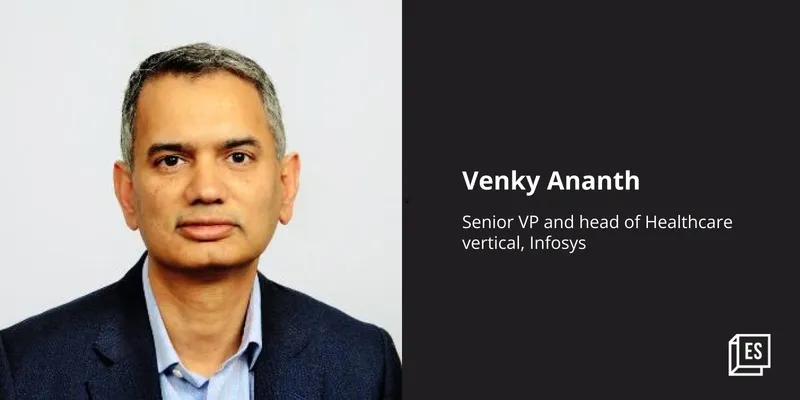How AI, ML can enable personalised healthcare services at lower cost
Venky Ananth, SVP and global head of Infosys’ healthcare vertical, believes emerging technologies like AI and ML can improve patient care using customisation.
The COVID-19 pandemic led to seismic shifts in the healthcare industry, which is now undergoing a rapid change largely driven by technology. The industry is now keen to adopt emerging technologies like artificial intelligence (AI) and machine learning (ML) into its operations.
Venky Ananth, Senior VP at and the global head of its healthcare industry vertical, strongly believes these technologies can reimagine the entire process of how the sector functions—be it around patient-doctor relationships, insurance companies, and pharma firms. In the end, all that matters is whether one delivers superior service at a lower cost.
Infosys has been driving this change through its Helix technology platform, Venky says in an e-mail interview with YourStory. “The physician can acquire contextual intelligence in care delivery, thus helping in improving patient care while reducing the cost of care due to avoidance of unnecessary tests and prescriptions.”
Edited excerpts of the interview:
YourStory [YS]: What broad legacy technology challenges does Infosys see in the healthcare ecosystem?
Venky Ananth [VA]: The healthcare segment has been traditionally a slow adopter of new technologies. However, the last few years have seen a change in trajectory with the adoption of new technologies—largely due to the COVID-19 pandemic, but also partly due to reforms like meaningful use, interoperability, no surprises act, etc. For organisations, the major deterrent in aligning with tech adoption is their investments in legacy systems and the cost of modernising them.
YS: What role can emerging technologies like AI and ML play in the healthcare industry?
VA: Digital leaders and startups entering the healthcare space bring deep domain understanding to innovate and create new business models and partnerships. In the West, the pharma and healthcare industries have already partnered with technology companies to discover new interventions such as gene editing and digital therapies to deliver better outcomes for patients.
In India, too, the convergence of these sectors has the potential to create a greater patient-centric healthcare model that prioritises well-being rather than just responding to illness. This will also drive traditional hospitals to explore new models of care, something that is already happening in urban hospitals across the country.
AI and ML can augment human expertise in making business decisions to create and sustain a competitive advantage. These technologies can enable healthcare professionals to reimagine their business processes, leverage configurable workflow, and prepare event-driven frameworks and analytical algorithms to re-imagine payer processes.

Infosys and Australian university form partnership for reskilling courses
YS: What benefits can one expect by deploying these emerging technologies?
VA: Transforming to a digital operating model will help players in the healthcare industry streamline operations across the value chain. Digital technologies can help address most of the basic challenges affecting the industry, whether it is the lack of awareness about health, access to healthcare, or the existing shortfall in the number of trained professionals.
Technologies like AI and ML enable data analysis, which helps acquire business knowledge on what patients want or prefer when it comes to fulfilling their healthcare needs. This further enables the customisation of healthcare offerings, costs, and even payment methods.
For example, AI-augmented care enables quicker and more accurate prognosis of certain disease conditions. The physician can acquire contextual intelligence in care delivery, thus helping in improving patient care while reducing the cost of care due to the avoidance of unnecessary tests and prescriptions.
YS: What is the USP of Infosys Helix?
VA: Infosys Helix offers a platform-centric approach to delivering patient care: leveraging data, connecting events of significance, dynamically orchestrating care pathways, and enabling care managers to facilitate the best care for patients. Infosys Helix’s “built on AI, runs on cloud” platform taps into the advantages of cloud computing and machine learning in helping payers and providers achieve their business processes in care delivery.
YS: What benefits will Infosys Helix’s clients see with the adoption of this tech platform?
VA: Affordability and ease of doing business. While the cost of care has been consistently going up year-on-year, Helix will play a significant role in process harmonisation and cost optimisation leading to reduced administrative costs and helping improve the experience for payers, providers, and the patients they serve.
Edited by Kanishk Singh






